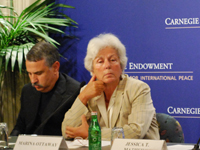Registration
You will receive an email confirming your registration.
After a half decade of seemingly hopeful developments, the drive for political reform in the Arab world has ground to a halt. In their new book, Getting to Pluralism: Political Actors in the Arab World, Carnegie’s Marina Ottaway and Amr Hamzawy present the collected findings of years of research and direct engagement with key political actors across the Arab World. They discussed these findings with New York Times columnist Thomas Friedman, in an event moderated by Carnegie’s President, Jessica T. Mathews.
Resistance to Political Reform
When the authors first started working on the issue of political reform in the Arab world in 2003, there was a sense that changes were coming. Unfortunately, the drive for reform seems to have fizzled out and political dynamism in the Arab world has faltered. Ottaway explained that the lack of reform in the region is in large part a result of the fact that democratization is above all a power game: there can be no democratization without redistribution of power. Arab governments have proved quite resistant to power-sharing and opposition parties, lacking strong popular support and often disorganized, have not been able to force a more balanced distribution of power.
While many Arab regimes have introduced some real reforms, these have generally been technical in nature, primarily affecting economic, financial, and administrative areas, none of which directly address issues of democratization.
Islamist and Secular Opposition Groups: Powerless and Unsuccessful
Secular parties in the region are extremely weak, Ottaway elaborated, and unable to develop an effective message. Liberal parties have never been strong except when they linked their political message to nationalist demands, but nationalism lost its appeal once countries gained independence. The appeal of Leftist parties was historically based on their demand for social justice, but that position has more recently been appropriated by Islamist parties.
Early this decade, Islamist parties began showing considerable gains in elections in the Arab world. Many were expecting to see sweeping victories in the following elections. Instead, the entire region saw a general decline in the success of Islamist parties. Ottaway argued that even when Islamist parties appeared successful, that was only in comparison to the other opposition parties. No party truly captured the support and the imagination of a wide segment of society, as demonstrated by low voter turnout. Islamist parties today are more inclined to discuss what went wrong than to predict victory.
Return to Regional Politics
Hamzawy reiterated Ottaway’s point that in spite of the push for reform since 2003, Arab politics have not changed a great deal. He attributed the failure of democratic political reforms to two general aspects. The first was regional. He noted that democracy and democratic reform are no longer extensively debated in the Arab world, as they were at the beginning of the reform dynamism. Instead, regional issues dominate the political landscape. Local issues, like political reform, are no longer as crucial a part of political debate in the Arab world. Hamzawy described a clear disenchantment among Arabs concerning politics, which has led active Arab citizens to search for different avenues for addressing socioeconomic issues.
New Openings in Arab Political Landscape
On the other hand, Hamzawy highlighted several openings in local and national political landscapes. While the scene remains unchanged in terms of hard politics, he pointed out increasing signs of pluralism in most Arab countries. In particular, elections have been taking place in the majority of Arab countries, a democratic trend that is unlikely to disappear. There have also been new dynamic spaces for expressions of social unrest, with a noticeable increase in labor sit-ins and strikes regarding “bread and butter” issues.
This led to Hamzawy’s second observation regarding the failure of democratic political reform. Participation in these social unrest movements is growing, but they are not a part of the political system for reform. Civil society has been organizing, employing new kinds of organization, including internet-based activism – although internet-based activism in the Arab world is not yet at the level reached in Iran this past year. This new activism remains an urban phenomenon that has transcended ideological barriers. Its members have no clear political platform nor do they have the mechanisms needed to channel their movement back into conventional politics. The Arab governments stand as gatekeepers, preventing these new movements from entering the traditional political arena.
Friedman: U.S. Power and Political Opportunities
Friedman argued that the impetus towards pluralism in the Middle East happened in the context of massive exercises of American power in the region under the administration of George W. Bush. He cited Iraq as an example of a move towards horizontal dialogue, as opposed to the more typical top-down communication in the Arab world. This first attempt at dialogue between the constituent elements of Iraq might open up the opportunity for Arab democracy in the region, he speculated.
Friedman described some “regime lids” as being “loosened” across the region, or even removed entirely, as in the case of Iraq. In these turbulent political conditions, Arab constituents tend to initially gravitate toward Islamist movements. He found it interesting that, in every theater, the Islamists overplayed their hands and subsequently faced a backlash from progressive forces. Friedman pointed out that Osama bin Laden and al-Qaeda have badly damaged Islamist movements, particularly since the moderate Islamist movements have not been condemning nihilistic Islamist groups.
Alluding to the rapid growth in the number of bloggers and users of Facebook and other social media, Friedman said that for the first time in the Arab world, progressives had a simple way of communicating, a virtual mosque online to compete with the real mosques Islamists use to communicate and organize. The challenge now is for the progressives to learn to move “from the chat room to the cloakroom” where actual policy is being made.
